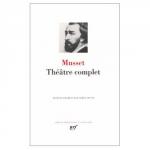|
This section contains 3,655 words (approx. 13 pages at 300 words per page) |

|
SOURCE: Bishop, Lloyd. “Romantic Irony in Musset's ‘Namouna.’” Nineteenth-Century French Studies 7, nos. 3-4 (spring-summer 1979): 181-91.
In the following essay, Bishop regards Musset as the first practitioner of Romantic irony in French poetry and drama and evaluates his use of this mode in the long poem “Namouna.”
Since romantic irony, as Henri Peyre has pointed out, has been studied chiefly by German scholars and has received relatively little attention by specialists of French Literature, a definition or two may be in order at the outset.1 In A Dictionary of Literary Terms (Barnet et al) we are told that “The romantic ironist detaches himself from his own artistic creation, treating it playfully or objectively, thus presumably showing his complete freedom.”2 Henri Peyre stresses the crucial point that this ironic detachment comes not after but during the creative performance itself: “Through that irony, the creator stressed his independence of his own...
|
This section contains 3,655 words (approx. 13 pages at 300 words per page) |

|


